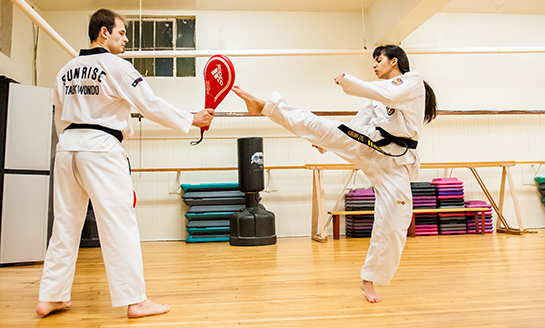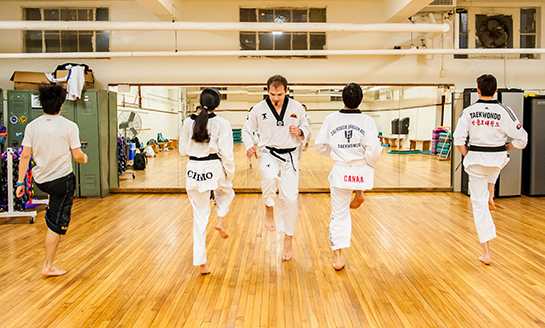HÂţ»'s Dragon Rise Tae Kwon Do Society (DDRTKD) helps students get their kicks — and punches, and blocks and more.
“Our goal is really to introduce technique, get people fit, and give them something to go for,” says Trayan Kolev, president of DDTRKD. “We focus on how to kick, how to punch, how to block, how to protect yourself.”
DDRTKD meets twice a week in the dance studio inside Studley Gym for a high-intensity workout — a combination of stretching, cardio and technique. Due to lack of prep time, the team can’t test members, but advancing belts isn’t what DDRTKD is about.
“A big part of what we do is have fun,” says Trayan. “We’re jumping, we’re flying. Often you see people flying through the air to kick stuff.”
Tae Kwon Do was first developed in Korea in the 1950s, with the North and South each developing their own styles. It wasn’t until the 1988 Seoul Olympics that Tae Kwon Do was really introduced to the world. It became an official Olympic sport in 2000. It’s now the most practiced martial art in the world.
Trayan explains there are two styles of Tae Kwon Do that differ depending on what part of the body you hit with. The first is World Taekwondo Federation (WTF) style — of which Trayan is a black belt — where you can only kick your opponent. This is the Olympic style. “The idea is you kick your opponent to the head and knock them out cold,” says Trayan.

The second style is International Taekwondo Federation (ITF), which is the North Korean version where, “you’re only touching your opponent, not smashing them to bits.” In this style, you can use both your hands and feet.
Trayan says every instructor has their own way of teaching, but the essence of Tae Kwon Do lies in understanding the body.
“We want to push our students in the fitness direction where they can get their feet wet trying to understand how Tae Kwon Do feels when you train, and once you get pushed to train,” he says.
Like a varsity team without the pressure, Trayan helps train members in a well-rounded, comfortable environment. He says the best people to actually start with the society have no experience, because he’s then working with a “fresh canvas.”

Just like other martial arts, there are eight colour belts in Tae Kwon Do through which beginners learn how their bodies move and react. Black belts hone secondary skills, where Trayan claims “the real education starts.” At the sixth degree, you’re considered a master and can develop your own school.
Even if you’re not interested in a lifetime of Tae Kwon Do, the workout is well worth the investment. The art teaches a great deal of stamina, dexterity and self-defence.
“The practicality of martial arts is debatable,” says Trayan. “In a street fight, you’ll never put your foot on another person’s head.”
This is where blocking comes in. Koreans developed patterns, called poom, where you imagine an opponent coming from one side. The art becomes about anticipation, and always being on guard. “It’s an idealistic way of looking at self-defence,” says Trayan.
Though the exercises may be demanding, Trayan stresses that DDRTKD wants to be as friendly as possible, and is always open to new members and ideas. Practices are free and uniforms can be purchased for $20. All you have to do is show up. Regular practice times are Tuesdays 5–7 p.m. and Thursdays 4–6 p.m. Any changes to the schedule will be made on the society’s . Check out DDRTKD on .

